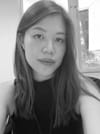A BABY SHOULD cry at birth. It must be traumatic being born, after all. The compressing comfort of the womb is suddenly gone, the noises and lights once gleaned through the mother’s body now rush in unfiltered.
The first journey the former foetus goes upon is a watery slide. And then its umbilical cord is cut. No more automatic feed. Trauma indeed.
Then follows the shock of countless new impressions from a boundlessly extended world outside the mother. No wonder babies have to sleep all the time. It is good trauma therapy, and a perfect getaway.






